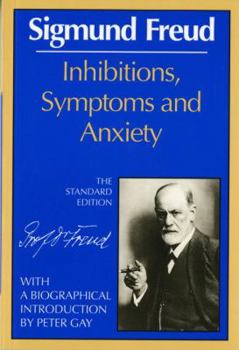Inhibitions, Symptoms and Anxiety
Select Format
Select Condition 
Book Overview
Setting forth in rich detail Freud's new theory of anxiety, Inhibitions, Symptoms and Anxiety (1926) is evidence for one of them. In rethinking his earlier work on the subject, Freud saw several types of anxiety at work in the mind and here argues that anxiety causes repression, rather than the other way around.
Format:Paperback
Language:English
ISBN:0393008746
ISBN13:9780393008746
Release Date:September 1990
Publisher:W. W. Norton & Company
Length:176 Pages
Weight:0.34 lbs.
Dimensions:0.5" x 5.3" x 7.9"
Customer Reviews
4 ratings
Very Helpful
Published by Thriftbooks.com User , 14 years ago
I ordered this book for my son who is dealing with some personality disorders. This book has been very relevent to him in helping him distinguish issues he has been dealing with.
Crucial to theory of anxiety
Published by Thriftbooks.com User , 17 years ago
Often overlooked, this concise exploration of origins and manifestations of anxiety is often brilliant and provocative. Freud explores the basic properties of fear, anxiety, and touches on the sexual component of these human states of mind/body. Freud hypothesizes that the origin of anxiety is founded in the repressed memory of the human's separation from the mother's originary nutrition during the act of birth. All manifestations of anxiety are (in essence) a resurgence of this primal fear. This is crucial to the role of biology and nourishment to psychoanalysis, often glossed over in its modern variants.
Eye-opening, informative, NOT for the layman
Published by Thriftbooks.com User , 19 years ago
The previous reviewer was correct in his/her statement that this text is not at all for the layman. I am not trained in the field, and was only able to understand any of it after having read most of the body of Freud's work. However, at about 120 pages, this brief exegesis on anxiety (called a neurosis in Freud's day, now called a disorder) is an informative look at three things: Freud's peculiar but influential theory on neurosis; something of what psychology was in the first half of the twentieth century; and a fascinating spin on anxiety and its causes and symptoms, as Freud and the early analysts saw it. Put simply, Freud described anxiety as essentially a glitch in the interaction between the ego (control) and id (animal desires); or a problem with a person's fight-or-flight response. This definition, I believe, has survived somewhat into the present, though Freud's explanation of the cause of the glitch resting primarily in the supression of the libido has probably been somewhat discounted. Remember: Freud's theories were very viable, it was his explanations (based on sexuality) that are brought into question. The other components of the title, inhibitions and symptoms, can be most simply defined as follows. In the case of inhibitions, those things that prevent the id from experiencing its pleasure successfully (Freud broke the necessity of function down to what he called the Pleasure Principle, or the fact that at root we all seek pleasure to satify our id). And in the case of symptoms, the physical and psychosomatic manifestations of the results of those inhibitions working against the id. In short, anxiety is the symptomatic result of the problems caused when inhibitions are instituted by the ego in an attempt to control the id. The take away from this is that, although much of Freud's actual explanations have been revamped and often discarded, his theories, as in the present case of anxiety, are still fascinating and worth a look. If you can get through the couched terminology.
A Classic
Published by Thriftbooks.com User , 24 years ago
Really hard to read, this book is not for the laymen.





